
















From the Director 3
Facts and Figures 4
Addressing Racial Justice 6

Faculty Research Spotlight
Stefanie Dunning 7
Exploring Big Ideas 8
Faculty Research Spotlights


Daisy Hernández 10 Daniel Prior 11
A Hub for Student Research 12
From Workshop to Book 14
Facu lt y Resea rch Spot l ig ht
Jorda n Fenton 16
The Collaborative Spirit of Experimentation 18
The Power of Public Engagement 20 Support in a Changing World 21

One of the most important functions of the Humanities Center is facing the grand challenges of our time. Each year, the center assembles teams of faculty and students to lead our community in the study of problems like pandemic, climate change, and distrust in democratic institutions.

I am proud to report that in 2021-22, Miami’s Provost asked the Humanities Center to coordinate the university’s inaugural Focus Program on “Race and Racial Justice.” Launched during a national crisis in race relations and ongoing attempts to increase diversity, equity, and inclusion at Miami, it was crucial to have deep and meaningful discussions of race and racial justice throughout the year. Starting a year in advance, the Humanities Center worked with more than a dozen campus partners and created a program of 25 talks, performances, film screenings, alumni gatherings, and other special events across five colleges. We brought internationally recognized intellectuals to campus for public lectures, workshops, and intense conversations with Miami students. We interacted with the Pulitzer Prize-winner Isabel Wilkerson, the
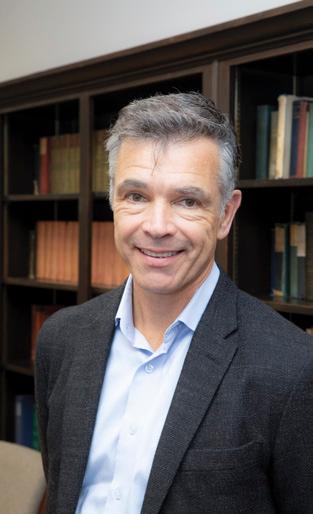
reknowned philosopher Achille Mbembe, MacArthur Fellow Natalia Molina, National Portrait Gallery historian Gwendolyn Shaw, psychiatrist Jonathan Metzl, British journalist Angela Saini, and the cultural critics Calvin Warren, Patricia Holland, and Lorgia García Peña, among others. These events were formally incorporated into the syllabi of almost 50 undergraduate courses. They were also tied to study groups, research apprenticeships, book clubs, and a new Humanities Lab in which Miami students created digital tools for teaching Black history at Cincinnati’s Aiken High School.
This robust programming touched many people. More than 1,000 students took courses connected to the program, and almost 3,000 people attended public events on racial justice last year.
This is what it means to think seriously, as a community, about pressing social challenges. To be truly rigorous, inquiry must be sustained, collaborative, and inclusive, so that multiple perspectives can illuminate complex problems. By
connecting faculty, students, and the public, we’re able to work together not only to advocate for more diverse and inclusive institutions but also to cultivate future scholars and leaders committed to social justice. The Humanities Center models the true purpose of higher education—which is not to prepare for a job but to gain a deeper understanding of how we can work together toward a better society.

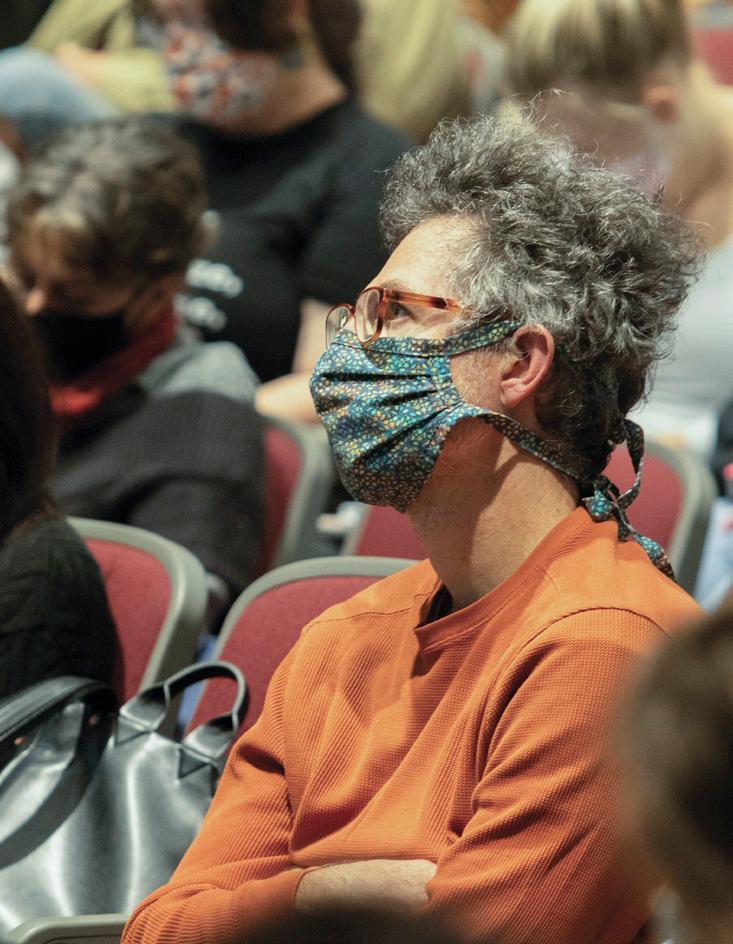
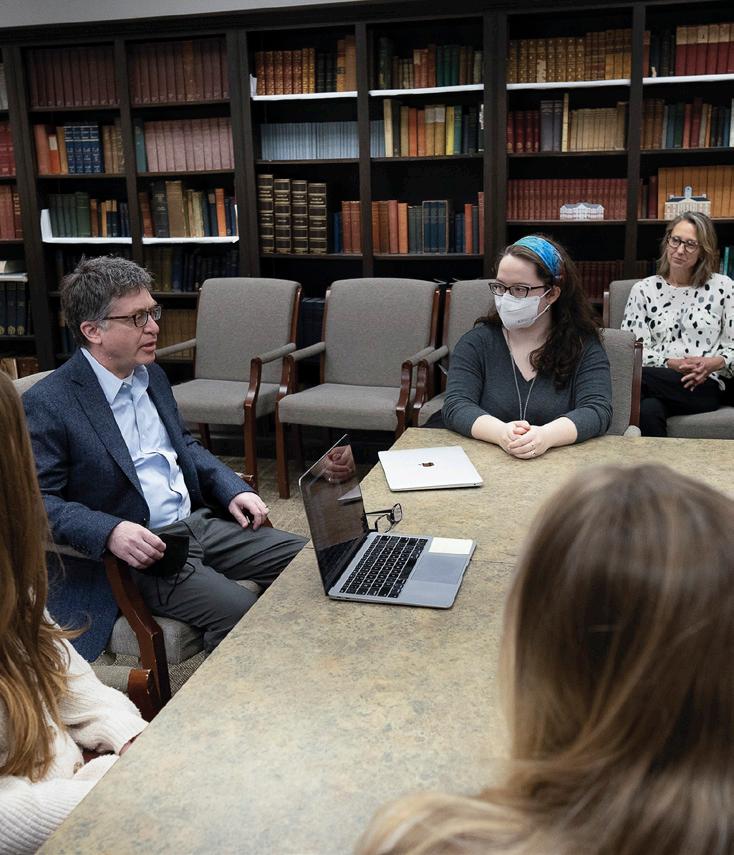
Each year, the Altman Program leads campus-wide inquiry into a topic of critical importance to foster collaboration, pedagogical innovation, and new research across the humanities and beyond. In 2021-2022, it explored “Race and Racism: The Problem of Persistence.”
From its origins in colonialism and enslavement to its modern consequences in cycles of poverty and social segregation, racism has persisted in the face of efforts to end it. It is woven today into systems of law and criminal justice, medicine and health, housing, education, media representation, and more. As recent protests in the United States demonstrate, racism is neither past nor elsewhere; it is part of the historical terrain we inhabit, a system that continues to shape our thinking, our work, and our lives. And yet, despite the glaring inequities it produces, racism’s origins, legacies, and structural logics are often obscured

by institutional complexities and tangled in values such as merit, citizenship, freedom, and law.
“Race and Racism: The Problem of Persistence” invited the entire Oxford, Ohio, community to explore this issue through special programs, coffee hour discussions, and lectures by distinguished intellectuals from around the world. To encourage innovative, cross-disciplinary approaches, 20 Miami University faculty members and student fellows were also brought together to deliberate in biweekly seminars, special classes, research collaborations, and outreach programs.
The program began with a lively book club on the #1 New York Times bestseller, “Caste: The Origins of Our Discontents.” Written by Pulitzer Prize–winning journalist Isabel Wilkerson, it examines the unspoken caste system that has shaped America and shows how our lives today are still defined by a hierarchy of human divisions. Sixty faculty, staff, students, and community members gathered to discuss the book prior to Wilkerson’s lecture to a packed Hall Auditorium in early September.
The Humanities Center received a SHARP (Sustaining the Humanities through the American Rescue Plan) grant from the National Endowment for the Humanities (NEH) for the 2021-2022 John W. Altman Program, “Race, Racism, and Racial Justice.”
I’ve been giving a lot of talks on my latest book, “Black to Nature: Pastoral Return and African American Culture,” which came out last year. I’ve also been planning my next project, which performs an ecological and critical race theory reading of outer space through black speculative fiction, music, and film.
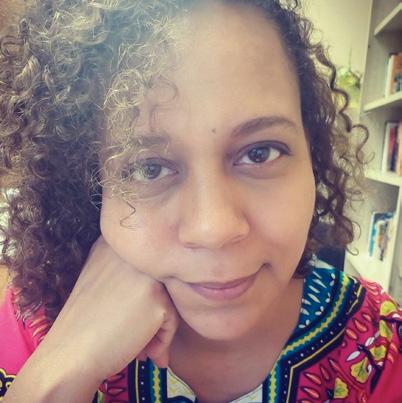
How was the experience of translating your book into a podcast?
I thoroughly enjoyed producing both the book and the podcast. The podcast was started while my book was in production, and it was fun to engage my own research in another format while bringing in people who’ve impacted my thinking on blackness and nature.
Why is it important to do both a book and a podcast?
Podcasts are less formal, allowing for the transmission of affect through music and voice modulation that words on a page can’t. It allows me to briefly touch on questions and topics, whereas in the book I can go in-depth and carefully analyze issues. Basically, the podcast is the beginning of the conversation, and the book is the extension of it.
The Altman program allowed me and my co-fellow, José Amador, to curate a broader conversation about the persistence of racism in our societies. Having time and space to think deeply about these issues — and to read some new work by both established and emerging scholars — has given me great ideas about what I’ll do in my next project. One of the most rewarding experiences I had was being able to invite Sharon Holland to campus where we had long, extended conversations about her work and mine.
The humanities enable encounters with beauty and artistry, which expand and elevate our experience of being alive. Students desperately need the fields of literature, history, art, and philosophy to understand why our world is the way it is, while simultaneously imagining and speculating about new worlds. Without the humanities we could feel that the conditions of our everyday existence sprang from nowhere, that our current conditions are ahistorical, which could then lead us to repeat the mistakes of the past.

As part of the John W. Altman Program, the Humanities Center invited 10 distinguished intellectuals to engage the Oxford, Ohio, community in passionate conversation about the persistence of racism in cultural, political, and institutional forms.




Isabelle
WilkersonWinner of the Pulitzer Prize for Journalism and recipient of the National Humanities Medal, Wilkerson led a dialogue about race and the unacknowledged caste system in the United States.
Achille Mbembe
Political theorist and Research Professor in History and Politics at the University of the Witwatersrand, Mbembe discussed the overlooked role of race in European modernity and the possibility of new liberatory models of community.
Jonathan Metzl
American psychiatrist, author, and Frederick B. Rentschler
II Professor of Sociology and Psychiatry at Vanderbilt University, Metzl examined how right-wing backlash policies have mortal consequences, even for the white voters they promise to help.
Sharon Patricia Holland
The Townsend Ludington Distinguished Professor in American Studies at the University of North Carolina at Chapel Hill, Holland explored the relationship of Blackness to notions of animality.
Angela Saini
British science journalist, broadcaster, and award-winning author, Saini traced the tragic history of attempts to establish a scientific basis for racial difference.
THIS IS MY STORY, THIS IS MY SONG: BLACK MUSIC, BLACK SOUND, AND THE UNMASKING OF POST-RACIAL AMERICA
Tammy Kernodle University Distinguished Professor of Music at Miami University, Kernodle examined the fabrication of post-racial America and the musical reactions of African American artists.
Natalia Molina
Distinguished Professor of American Studies and Ethnicity at the University of Southern California, Molina examined the intersections of race, gender, culture, and citizenship.


PAINTING AND PREJUDICE: RACISM IN THE MAKING OF AMERICAN ART HISTORY
Gwendolyn Shaw
Class of 1940 Bicentennial Term Associate Professor in the Department of the History of Art at the University of Pennsylvania, Shaw discussed the role racism played in American art history.
Lorgia García Peña
Author and the Mellon Professor of Race, Colonialism, and Diaspora at Tufts University, Peña discussed how Black Latinidad can help us understand both oppression and resistance.
PHONOLOGICAL VIOLENCE:
Calvin Warren
Associate Professor of African American Studies at Emory University, Warren explored the philosophical implications of constant surveillance on Black identity.
How did you enjoy your moment at the PEN America Literary Awards ceremony?
It was amazing! I wasn’t expecting it at all, so it came as a huge shock. The ceremony is similar to the Oscars where you don’t find out which author won which prize until you’re there. It was incredible to hear my name called.
What have you been working on this academic year?
I’ve been celebrating the publication of my book “The Kissing Bug!” I also finished a short story that is forthcoming in the Iowa Review and an essay on the Midwest that will be published this June.
What are the key insights you had while writing “The Kissing Bug?”
When it comes to public health in the U.S., we have a policy of containment rather than eradication; and these efforts unfortunately break down along race and class lines. For example, many Americans don’t think about tuberculosis, but the disease is still found in immigrant communities because we didn’t find a way to make treatments sustainable for communities around the world.
I worked on this book for seven years, during which I learned a great deal about medicine, public health, and racial politics. I wanted to understand why the U.S. had ignored Chagas — a parasitic disease that disproportionately afflicts Latinx immigrant communities — for more than 100 years. To grasp this neglect in public health, I interviewed doctors, patients, their families, and many other experts.
How did the Altman Program contribute to your scholarship?
The Altman program allowed me to spend a glorious year immersed in the world of the medical humanities. Being in conversation with faculty at Miami, as well as with invited speakers, introduced me to many new ideas that ultimately informed “The Kissing Bug.”
I was particularly moved that we were able to bring the science writer Sonia Shah to campus — listening to her talk about her book on pandemics helped me consider how I was approaching my own work and provided me with a new perspective when COVID-19 hit.

 Director of Graduate Studies and Professor of History
Director of Graduate Studies and Professor of History
What have you been working on this academic year?
My current project is a collaboration of six scholars from the U.S. and Kyrgyzstan. We are examining manuscripts about the history, literature, and oral traditions of nomadic Turkic people from central Asia from 100-250 years ago.
Why is this work important?
These materials haven’t been studied much because they are oral-derived, and that kept historians from using them. They need to be studied in a holistic cultural context where their writing systems, and the physical constitutions of the documents, can be worked out in relation to cultural knowledge.
How did the Humanities Center contribute to your scholarship?
The Digital Humanities Fellowship allowed me the opportunity to build my website with Alia Wagner in the Miami University Libraries and a history honors student who helped populate the website with the Turkish language. This work led to an NEH Collaborative Research Grant that now allows the entire team to meet in person and advance our project.
How has your work embraced digital methods?
Our project uses a type of linguistic and paleographic analysis, which has recently been pioneered in different fields with similar methods, such as the use of artificial intelligence in paleographic analysis. And while this is an interesting example of embracing digital methods in the humanities, we still need to be trained in paper and pencil methods to understand the reality we share with our fellow humans.
Each year, the Humanities Center selects up to 10 undergraduate students for its highest honor: the Geoffrion Family Fellowship.
The Geoffrion Program allows outstanding students to work one-on-one with faculty, interact with distinguished visiting writers and intellectuals, and develop advanced skills in research and public engagement. Fellows produce both individual research projects and collaborative public projects, delivering lectures on their work to the Miami community each spring.
In 2021-2022, the Geoffrion Fellows worked with Altman Program faculty to create a film about racial and ethnic identity at Miami. Through scores of interviews and careful editing, the project follows students and faculty as they navigate racial difference in Oxford, Ohio. The film was displayed as an installation in the exhibition “Reflections: Visual Constructions of Race” at the Miami University Art Museum and at Cincinnati’s Contemporary Arts Center.

Intended for first-, second-, and third-year students, this winter workshop helps undergraduates kickstart independent research projects. Participants develop proposals, identify mentors, meet with leading faculty members, and learn best practices in various humanities fields, such as literature, history, language, classics, philosophy, and comparative religion.
Supported by the National Endowment for the Humanities, the Research Apprenticeship Program provides undergraduates with invaluable opportunities to learn research methods in a one-on-one collaboration with a faculty member. Apprentices contribute to published scholarship, develop close relationships with faculty members, and gain valuable, practical experience sought by graduate schools and employers.
Each year, the Humanities Center offers a workshop to undergraduates interested in pursuing independent study. Whether they are coming with research projects in mind or are simply curious about how academic research works, the Path to Research in the Humanities introduces these young scholars to the benefits and purpose of research in the humanities and connects them with resources to get their projects started.
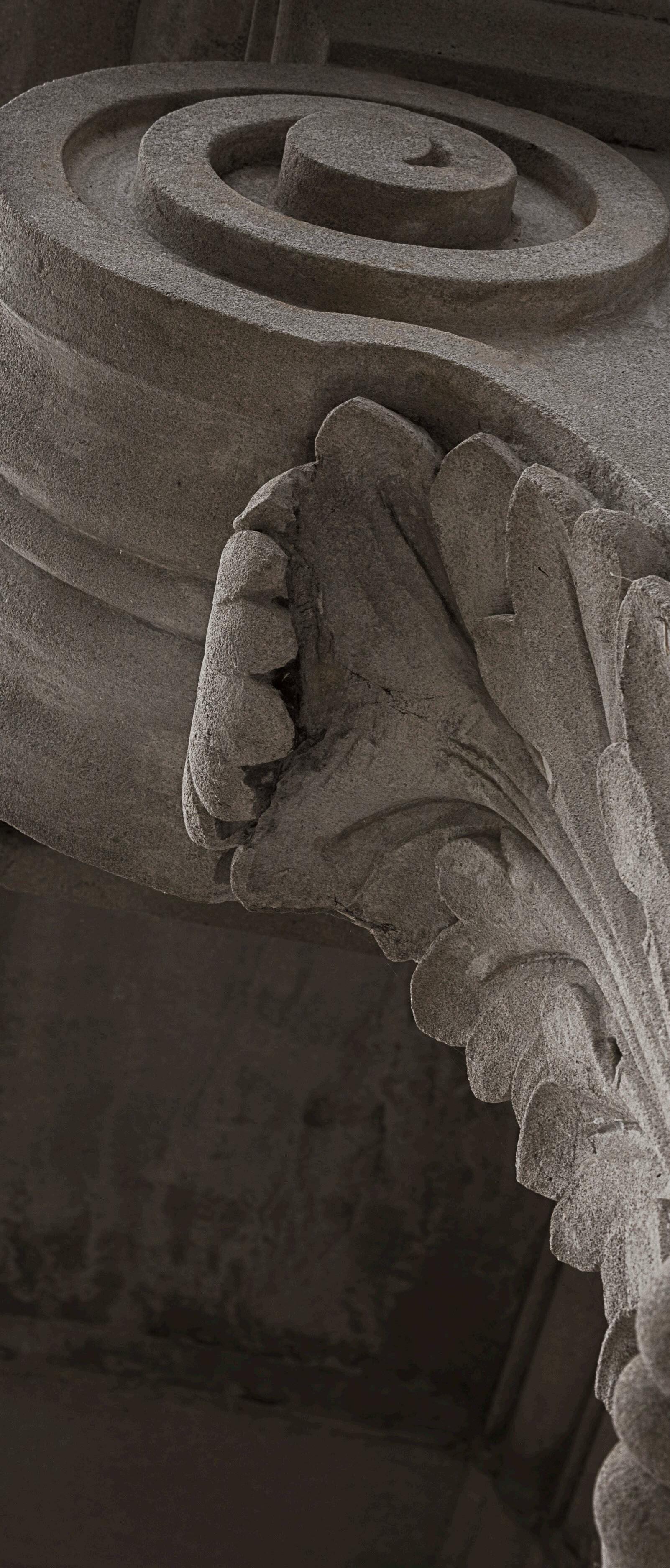


Bring the World to the Child: Technologies of Global Citizenship in American Education
Free Thinker: Sex, Suffrage, and the Extraordinary Life of Helen Hamilton Gardener
Capturing Finance: Arbitrage and Social Domination
The Kissing Bug: A True Story of a Family, an Insect, and a Nation’s Neglect of a Deadly Disease
Understanding World Christianity: Russia
Museums of Communism: New Memory Sites in Central and Eastern Europe
Intimate Eating: Racialized Spaces and Radical Futures
PENNINGTON The Media World of ISIS
The Committee: A Study of Policy, Power, Politics and Obama’s Historic Legislative Agenda on Capitol Hill
The Akunin Project: The Mysteries and Histories of Russia’s Bestselling Author

International Studies: An Interdisciplinary Approach to Global Issues

Religion, the Body, and Sexuality: An Introduction

Over the past year, I’ve served as co-curator of a traveling exhibition titled, “New Masks Now: Artists Innovating Masquerade in Contemporary West Africa.” It will be hosted at the Smithsonian’s National Museum of African Art, the North Carolina Museum of Art, the New Orleans Museum of Art, and possibly some international venues.
In 2021, our team was awarded an NEH grant to travel to West Africa and commission masquerade costumes from active artists. A major aspect of this project was considering more ethical methods in working with artists who live in previously colonized spaces, and one of my articles on ethical fieldwork and commissioning practices with living African artists served as the methodological framework for the exhibition.
A long-term commitment to fieldwork is important for the type of ethnographic research I conduct in Nigeria. Building trust with elders and cultural custodians develops meaningful relationships based on reciprocal exchange; and as a white researcher working in Africa, being mindful of one’s privilege and not taking knowledge or information without thinking about how to give back is vital. Overall, I’ve learned that quality work, which is ethically built and cultivated, takes time and patience.
What is your goal with “Masquerade and Money in Urban Nigeria: The Case of Calabar?”
My book examines the ways in which masquerade and secret societies thrive in the urban city of Calabar. Built from my many trips to Nigeria — where I worked with elders and members who accepted me studying their culture and initiated me into the secret societies discussed in this book — it analyzes the economics and spatial power of masquerade while showing how so-called traditional culture gains new currencies with a contemporary, city-based context. I therefore endeavor to tell this story from the perspectives and voices that matter most: my adoptive Nigerian father and the elders, members, and cultural custodians who graciously allowed me access to their culture.
How did the Humanities Center contribute to your scholarship and publication?
My involvement in the Humanities Center Book Proposal Workshop and the Altman Program on “Urban Futures” were instrumental in the development of my book. The workshop provided a fantastic space to develop my book alongside other Miami faculty working on their own projects. The constant dialogue, advice, peer review, and brainstorming helped me produce a clear, complete, and comprehensive proposal that was polished and ready to be sent out and shopped by the end of the workshop.
Likewise, involvement in the Altman Program was impactful on my broader thinking about my work on a West African city. Led by Professors Cathy Wagner and Luis Pradanos-Garcia, it instilled in me a more holistic understanding of the pedagogical approaches around the topic of the future of cities. I cannot speak enough about how these two programs positively shaped the framing, development, and thinking of my research and book project.
While the sciences are important for understanding the world around us, the humanities are equally important for understanding our species’ role and greater duty within the broader cosmos. Crucial for imparting how flawed, contradictory, and problematic humans are — both in the distant past and the present moment — the many disciplines of the humanities are not unlike a mirror, allowing us to see ourselves for all that we are, all that we have been, and all that we could be. As we have seen and experienced lately, the current challenges we face in the world are layered and complicated. The role of the humanities is to teach us how to overcome these challenges through self-reflexivity and empathy — which is why they must be stressed, supported, and centered in all education systems across the globe.
Embracing the spirit of laboratory experimentation more familiar to the sciences, Humanities Labs stimulate student research and engagement. With the guidance of an interdiscipinary faculty team, students turn classroom topics and skills into a project that connects with the public and has outcomes communicable to the Miami community and beyond.
Professors Tammy Brown (Associate Professor, Critical Race and Ethnic Studies), Durell Callier (Assistant Professor, Educational Leadership), and students worked with Cincinnati Public School administrators and teachers to create digital tools for teaching African American history and antiracism philosophy. The lab explored antiracism as a pedagogical approach and way of being in the world through the study of major themes in African American history and culture. Lab students created an interactive African American history curriculum and a new smartphone app designed to increase high school student engagement and learning.
Led by professors Andy Rice (Assistant Professor of Media, Journalism, and Film) and Eric Hodgson (Smale Center Director and Associate Professor of AIMS), students collaborated to tell the history of the Vietnam War-era at Miami University. Lab participants created an augmented reality app to allow visitors to experience history as they walked through the Shade Family Reading Room in the Armstrong Student Center, which was built on the site of Rowan Hall. In October of 2021, the lab team hosted a panel at which faculty and alumni involved in the 1970 Rowan Hall protests shared their memories. As attendees later toured the Shade Room, the virtual history app activated videotaped performance pieces and interviews about the protests.
The Urban Architecture Lab was led by Jeffrey Kruth, Assistant Professor of Urban Design, Elizabeth Keslacy, Assistant Professor of the History of Architecture, and John Blake, Interim Director of the Center for Community Engagement in Over-the-Rhine. Lab members collaborated with the Over-the-Rhine People’s Movement in Cincinnati to preserve their legacy in a new archive that captured community members’ living memories. The resulting participatory exhibition was featured at the Miami University Center for Community Engagement, the Miami University Art Museum, and Cincinnati’s Contemporary Arts Center.
The Visible Religion Lab was led by Rosemary Pennington, Associate Professor of Journalism, and Liz Wilson, Professor of Comparative Religion. The lab team worked to identify and counter bias against religious minorities through the production of publicfacing scholarship that included audio and video interviews, summaries of survey research, and teaching modules. With faculty guidance, participants built relationships with Bhutanese Hindu refugees and Somalian Muslim refugees, conducting interviews to illuminate the obstacles faced when members of a particular religious community wear visible religious dress on the job or in public school settings in Ohio.
The Performance Lab was led by Ann Elizabeth Armstrong, Associate Professor of Theatre, and Katie Johnson, Professor of English. Featuring student research and experience-based projects, it utilized performance as a methodology of engaging vital social issues and enacting social change. Taking inspiration from the Living Newspapers of the 1930s, as well as from contemporary theatre practices, students in this lab researched, reflected, and took creative action as they experimented with ways to represent two complex civic problems: racism and climate change.
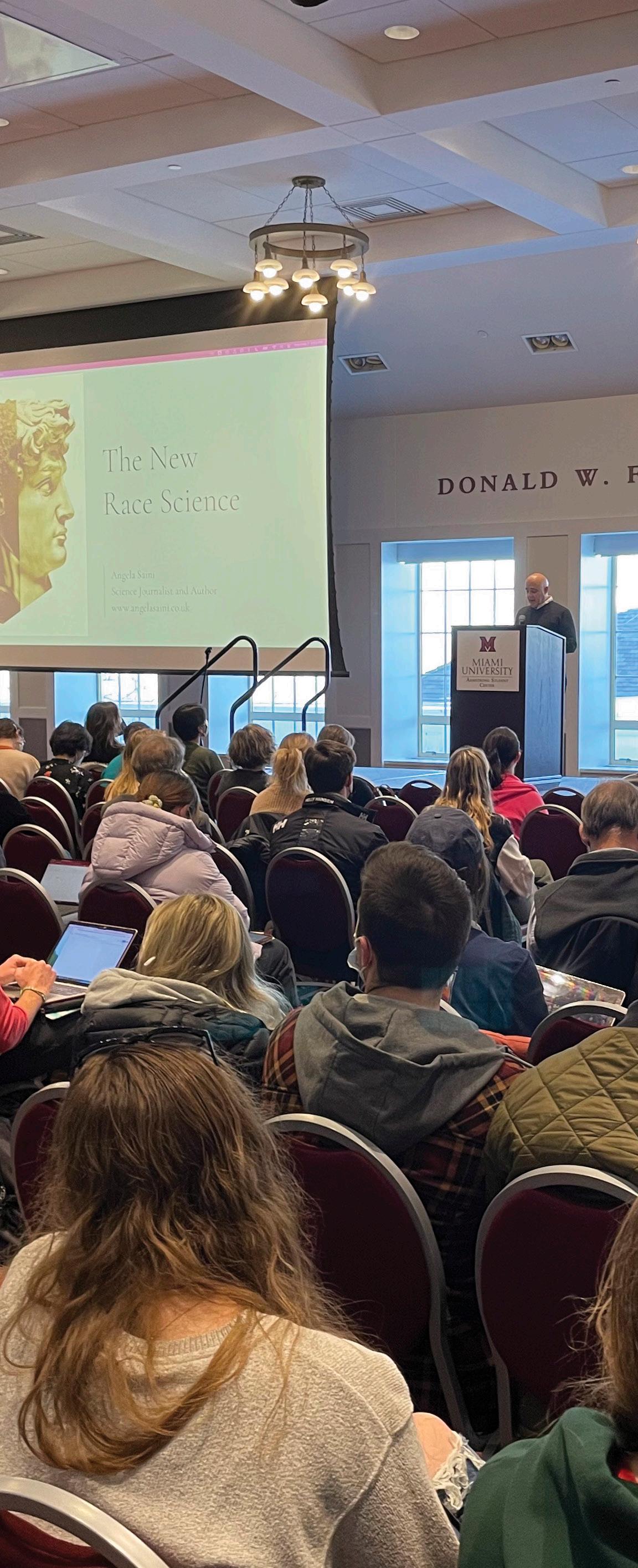
What are the rights of citizenship? What are the responsibilities? Is it universal, or is it culturally specific? More importantly, how does each of us enact our citizenship?
These were a few of the concepts explored in this year’s Student Citizens summer program, which aims to help underserved high school seniors find a pathway to college. Supported by full scholarships from the Teagle Foundation, students spent three weeks at Miami University exploring the nature of college and the meaning of citizenship. Participants studied classic texts in critical thinking; attended writing seminars with leading faculty; formed relationships with undergraduate student mentors; and experienced the power of the humanities when addressing the social issues confronting us today.
Accessible. Engaging. Rewarding. These pillars have anchored the Bridges Program since it was first founded four decades ago by Black Miami students. Seeking to make degrees more accessible to students from diverse backgrounds — and to ensure that their experience on campus is worthwhile — the program now provides an inside look at Miami University to high-achieving high school seniors from historically underrepresented populations. Knowing that choosing a college is about fit and match, it gives prospective students a chance to experience Miami through special humanities classes with leading professors through an overnight experience that connects them with current students, faculty, and staff.
In this online lecture series, the Oxford, Ohio, community was invited to listen in as Miami University alumni reconnected with distinguished humanities faculty members to explore the history and cultural legacy of figures who fundamentally transformed their societies.
• Tikhon Bellavin, Patriarch of the Russian Orthodox Church
• Nam June Paik, Father of Video Art
• Virginia Woolf, Pathbreaking Modernist
• Hannah Arendt, Humanist, Philosopher, Survivor
• Jimi Hendrix, Legendary Guitarist
• Adelita, embodiment of the Mexican Revolution
The Miami University Humanities Center continues to provide the ideal foundation for understanding the ever-changing human experience. Each year, we fund hundreds of students and faculty members engaged in research, curricular innovation, and public outreach. This support comes entirely from grants and donations by our generous Friends of the Humanities, who help us offer humanities labs, research apprenticeships, public lectures, symposia, conferences, and performances by visiting writers and artists.
Annual gifts provide support for faculty and student research, visiting scholars and artists, workshops, and community outreach.
Memorial and honorary gifts recognize an individual, organization, or cause by funding a program, scholarship, or annual event, such as a memorial lecture.
Endowments and planned gifts provide lasting support for the Humanities Center and its programs for the next generation of Miamians.
$50 — supports a student apprentice for a week of research or service with a faculty member.
$100 —supports a faculty-student seminar or workshop.
$200 — supports a public event with a virtual speaker or department-invited artist or lecturer.
$500 — supports an entire summer or winter workshop for students.
Learn how you can contribute to the center
HumanitiesCenter.MiamiOH.edu/support